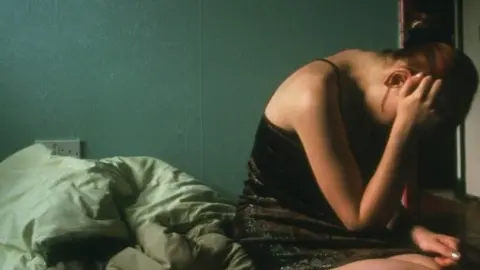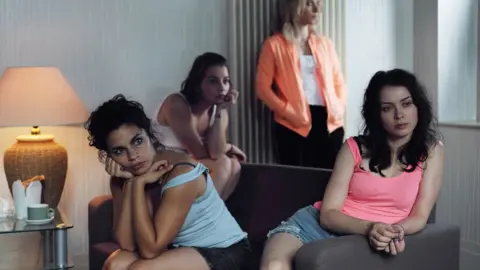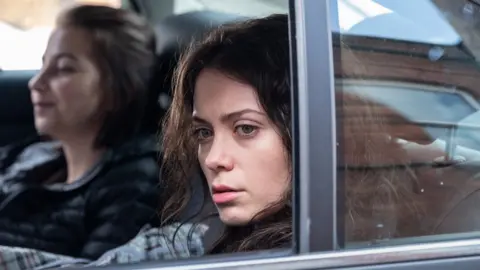Human trafficking rescues increase in Northern Ireland
 BBC
BBCAs many victims of sex trafficking have been rescued so far this year in Northern Ireland as in the whole of the previous year.
The PSNI saved 36 potential trafficking victims in the 2017/18 financial year.
BBC News NI understands that 36 victims were rescued in the first six months of the 2018/2019 financial year.
A new BBC drama tells the story of one woman trafficked and forced to work as a sex slave in Belfast.
Worldwide an estimated 4.8m women and girls are in forced sexual exploitation, according to the International Labour Organisation.
Some victims of human trafficking are 'labour slaves', but others are forced to work in the sex industry.
'Anna' was just one of them.
She eventually escaped her captors, who were later jailed for a range of offences.
Filmed mainly in Belfast, Doing Money is a hard-hitting BBC drama and is far from fiction.

The new drama features depicts the real life story of what happened to Anna.
She was trafficked and forced to work as a sex slave in Belfast before escaping her captors, who were later jailed for a range of offences.
Originally from Romania, she was kidnapped in broad daylight in London.
She was then sold to a gang who forced her to work in the sex industry in a number of cities in the Republic of Ireland and Northern Ireland, including Belfast.
Her mobile phone and passport were taken and she was told her mother in Romania would be killed if she tried to escape.
The gang kept her and other women in 'pop-up' brothels, often in residential areas and in seemingly ordinary houses and apartments.
Harrowing viewing
In all, Anna spent 10 months as a sex slave - raped by thousands of men - before she was rescued.
She later told her story to politicians at Stormont as part of the debates that led to a Human Trafficking and Exploitation Act being passed in Northern Ireland in 2015.
The title of Doing Money comes from one of Anna's traffickers.
"This one will do money," they remarked before forcing her into sex work.
The drama makes harrowing viewing as it portrays Anna's ordeal in detail, as well as the work of a PSNI team attempting to catch the criminal gang exploiting her.

Find out more
Anna spoke to Jo Fidgen on Outlook on the BBC World Service
You can listen again here

Anna is played by the Romanian actress Anca Dumitra, but the drama's screenwriter Gwyneth Hughes met the real Anna while writing Doing Money.
"I met her and listened to her over many hours of interviews," Ms Hughes said.
"It was the details that stuck with me and rang round my head."
"For example, her bewilderment at the critical reviews posted on sex websites by angry men."
"She wondered how they didn't notice the starved, bruised, desperate state of the women they'd just used."
"Everything you see in Doing Money really happened to Anna."

Eventually, as a result of an operation which included the PSNI, two of the gang who enslaved Anna were convicted of human trafficking, controlling prostitution and money laundering.
They served prison sentences in Northern Ireland and Sweden.
A spokesperson for the Department of Justice said that more people needed to know about the reality of human trafficking.
"The department welcomes the spotlight that this drama is bringing to the issue," they said.
"We often refer to human trafficking as a hidden crime, but we know that it is happening here."
"Some common signs and indicators include people living in poor conditions in an over-crowded house, someone who is fearful of the authorities, or someone with limited social access or no access to their passport or ID document."
"Other signs include someone who has unexplained injuries or someone who is escorted when they go to or return from work and other outside activities."
Doing Money will be broadcast on BBC Two on Monday at 21:00 GMT.

Where to get help
If you suspect someone is a victim of human trafficking, contact the police - call 999 if it's an emergency, or 101 if it's not urgent.
If you'd prefer to stay anonymous, call Crimestoppers on 0800 555 111.
If you want confidential advice about trafficking before calling the police, there are a number of specialist organisations you can talk to:
The Modern Slavery helpline 0800 0121 700, is open 24 hours a day.
If you think a child is in danger of trafficking you can contact the the NSPCC's helpline 0808 8005 000.
